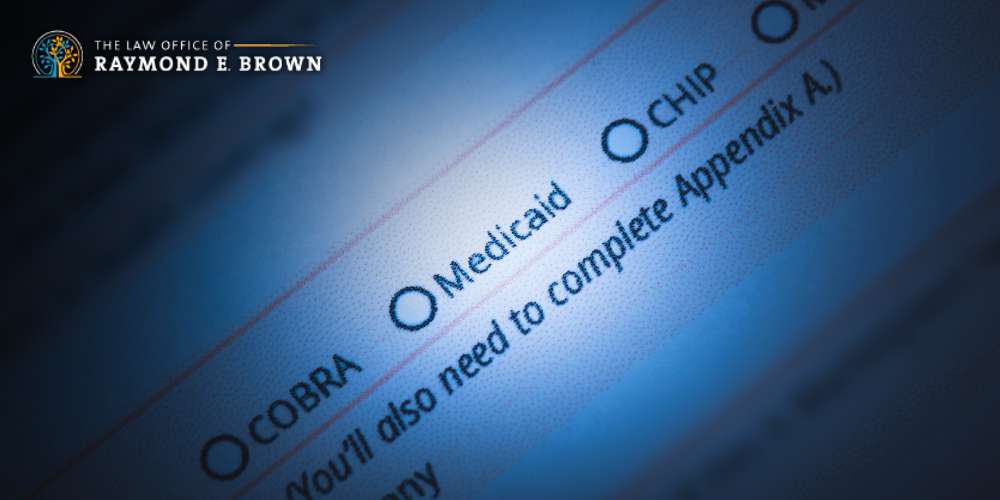
At The Law Office of Raymond E. Brown, we understand that the Medicaid qualification process in Maryland can be complex and time-sensitive. That’s why our Annapolis Medicaid planning attorneys are here to guide you through each step, ensuring all documentation is accurate and complete to help you secure the benefits you need as efficiently as possible.
To learn more about Medicaid and how The Law Office of Raymond E. Brown can help, call (443) 554-9944 or reach out online to meet with one of our experienced Medicaid planning attorneys today.
What Is Medicaid?
Medicaid is a public health insurance program in the United States designed to provide healthcare coverage to individuals and families with low income and limited resources. Jointly funded by state and federal governments, it assists eligible low-income adults, children, pregnant women, elderly adults, and people with disabilities in accessing necessary medical services.
In Maryland, Medicaid, also called Medical Assistance, is administered at the state level. According to the Maryland Department of Health’s Medicaid Administration, nearly 1 in 4 residents of Maryland access their health insurance through the Medicaid program. This program covers a wide range of health services, including hospital visits, doctor appointments, prenatal care, and long-term medical care.
Maryland Medicaid Eligibility Criteria
Medicaid eligibility in Maryland is determined by several criteria designed to ensure that medical assistance goes to individuals and families who need it most. Below is an overview of the general requirements for qualifying for Medicaid in Maryland:
- Residency and Citizenship: Applicants must be residents of Maryland and either U.S. citizens, permanent residents, or legal aliens.
- Income Level: Medicaid eligibility primarily depends on household income, which must fall below a certain threshold. This threshold varies based on family size, age, and the specific Medicaid program to which an individual applies. Generally, income limits are set as a percentage of the Federal Poverty Level (FPL).
- Household Size: The number of individuals in a household also plays a critical role in determining eligibility. Larger households may have higher income limits for qualification.
- Special Conditions: Certain groups, such as pregnant women, children, elderly adults, and individuals with disabilities, might qualify under different criteria or be subject to more lenient income guidelines.
These requirements are designed to ensure that Medicaid can provide necessary healthcare coverage to those who cannot afford private health insurance.
How Long Does It Take to Qualify for Medicaid Protection?
The time it takes to qualify for Medicaid protection depends on several factors, but generally, once an application is submitted, it will take a few months to process and determine eligibility. Applications involving straightforward cases often fall on the shorter end of this range, while those requiring additional verification, such as disability claims, can take longer.
Application Processing Time
The processing time for Medicaid applications typically ranges from 45 to 90 days, depending on factors such as the application volume and the complexity of individual cases, especially those involving disability claims.
The processing speed can also vary based on the efficiency of the local Medicaid office and the completeness of the application submitted. Delays often occur if the application contains errors or lacks necessary information.
Expedited Processing
In certain circumstances, expedited processing of Medicaid applications is available to individuals who require urgent medical assistance. This expedited service is typically available to applicants facing severe health crises, such as those who are pregnant, have acute medical conditions, or are in nursing facilities requiring immediate attention.
To qualify for expedited processing, applicants must demonstrate immediate medical necessity or meet specific state-defined criteria. When expedited processing is granted, the application can be reviewed and approved within a few days, ensuring that critical healthcare services and financial assistance are accessed immediately.
Factors Affecting Qualification Time
As we briefly touched on above, the time it takes to qualify for Medicaid coverage can be influenced by factors that may either expedite or delay the application process. Below are some of the more common factors that affect the qualification time for Medicaid in Maryland:
- Accuracy of Medicaid Application: Errors or missing information can delay the process as corrections and verifications are needed.
- Documentation Requirements: Extensive documentation is needed to confirm eligibility criteria, such as income, residency, and medical conditions, which can extend processing times.
- System Overload: High volumes of applications during economic downturns or public health crises can slow down processing.
- Medical Needs: Applications involving complex medical needs or disability assessments require more thorough reviews, leading to longer qualification periods.
Medicaid Look-Back Period
Understanding Medicaid’s 5-year look-back period is essential for anyone applying for long-term care coverage. This period covers the 60 months before a Medicaid application is filed, during which any asset transfers are closely examined to ensure they were not made below fair market value in order to be eligible for Medicaid.
If such transfers are identified, Medicaid imposes a penalty period, making the applicant ineligible for long-term care services for a duration calculated from the total value of the transferred assets. This penalty starts from when the applicant would have otherwise been eligible, significantly impacting their ability to receive benefits.
Consequences of Violating Medicaid’s Look-Back Period
Violating Medicaid’s 5-year look-back period can significantly affect long-term care coverage applicants. When asset transfers for less than fair market value are detected during this period, Medicaid imposes a penalty period of ineligibility.
This penalty period is calculated by dividing the total value of the improperly transferred assets by the average monthly cost of nursing home care in the applicant’s state. During the penalty period, the applicant will be responsible for covering their long-term care costs out of pocket. Additionally, this delay in coverage can create financial hardship and limit access to necessary medical assistance.
Maryland Medicaid Application Process
Several steps are involved when you apply for Medicaid in Maryland. First, you must gather the required documents, such as proof of income, residency, citizenship, and medical records. You may then apply online through Maryland Health Connection (click here), by mail, or in person at a local Department of Social Services office.
Once submitted, the application is reviewed. Remember, straightforward applications are typically processed within 45 days, but those involving disability determinations or complex financial information may take up to 90 days. Promptly providing accurate and complete documentation can help avoid delays.
After the review, you will receive a written notice of approval or denial. If approved, the notice will detail the start of your coverage. If denied, the notice will explain why and how to file an appeal.
Strategies for Qualifying for Medicaid Protection
Qualifying for Medicaid protection, especially long-term care, requires careful planning and adherence to specific guidelines. Here are some effective strategies to help applicants qualify for Medicaid programs in Maryland:
- Asset Reallocation: Work with an experienced Maryland estate planning attorney to legally reallocate or spend down assets in a way that complies with Medicaid regulations. This might include paying off debts, making home improvements, or purchasing exempt assets.
- Establishing Trusts: Certain trusts, such as irrevocable Medicaid trusts, can protect assets from being counted towards Medicaid eligibility. This is because the individual no longer owns assets placed in these trusts, but this must be done well before the need for Medicaid arises.
- Gifting: Carefully timed and executed gifting strategies can help reduce countable assets. However, to avoid penalties, this must be done with an understanding of the 5-year look-back period.
- Annuities: Converting assets into income through purchasing Medicaid-compliant annuities can help meet eligibility criteria. These annuities provide a steady income stream and can protect the spouse of the Medicaid applicant.
- Spousal Protections: Utilize Medicaid’s spousal impoverishment rules to protect the income and assets of the non-applicant spouse. This can include transferring assets to the spouse not applying for Medicaid.
- Prepaid Funeral Expenses: Prepaying funeral and burial expenses is a legitimate way to spend down assets, as these are considered exempt under Medicaid rules.
Engaging with an experienced Medicaid planning attorney in Maryland can provide personalized strategies for those applying for Medicaid coverage. At The Law Office of Raymond E. Brown, our Annapolis Medicaid attorneys can evaluate your circumstances to determine the best plan for qualifying for coverage.
Common Challenges and Mistakes in Medicaid Qualification
The Medicaid qualification process is complex, and common errors can delay or even prevent eligibility altogether. Mistakes such as transferring assets for less than fair market value during the 5-year look-back period can result in significant penalties and periods of ineligibility.
Other frequent issues include incomplete or inaccurate application information, misunderstanding eligibility criteria like income and asset limits, and poor planning for long-term care needs.
Mismanagement of spousal assets due to the confusing rules on protecting income and resources for the non-applicant spouse can also jeopardize Medicaid eligibility without proper guidance.
Medicaid Denials and Appeals
If your Medicaid application is denied, you still have a chance to appeal. First, review the denial notice to understand the reasons and instructions for filing an appeal. Gather relevant documentation, such as proof of income, asset details, and medical records.
Your appeal request should be filed within 30 to 60 days from the denial notice date. Prepare for the hearing by organizing documents and consulting with a Medicaid attorney, like those from The Law Office of Raymond E. Brown.
Your attorney will attend the hearing and help you present your evidence. After the hearing, you will receive a written decision. If successful, your Medicaid benefits will be approved; if denied, you may pursue a higher authority or judicial review.
How Raymond E. Brown Can Help with Medicaid Planning
Annapolis estate planning attorney Raymond E. Brown can provide invaluable assistance with Medicaid planning as well as all other areas of estate planning. His knowledge of Maryland Medicaid law ensures that clients understand the complex eligibility requirements and avoid common pitfalls, such as improper asset transfers, that can result in penalties.
By offering personalized advice and tailored plans, attorney Raymond E. Brown helps clients optimize their financial situation to qualify for Medicaid benefits without compromising their financial security. His guidance simplifies the process, providing peace of mind and ensuring timely access to necessary healthcare services.
Our Comprehensive Annapolis Estate Planning Services
At The Law Office of Raymond E. Brown, our comprehensive estate planning services are designed to safeguard your assets and protect your financial legacy. As such, our estate planning attorneys provide personalized support tailored to your unique needs, including creating wills, trusts, Powers of Attorney, and so much more. Our practice also extends to advanced planning strategies that protect your wealth from potential creditors and minimize tax liabilities.
Call a Maryland Estate Planning Attorney at The Law Office of Raymond E. Brown Today
For guidance and support in Medicaid planning, call a Maryland estate planning attorney at The Law Office of Raymond E. Brown today. Our dedicated team is committed to helping you protect your assets and secure your financial future.
Call (443) 554-9944 or complete our online intake form to schedule a consultation with a Medicaid planning attorney on our team today.







